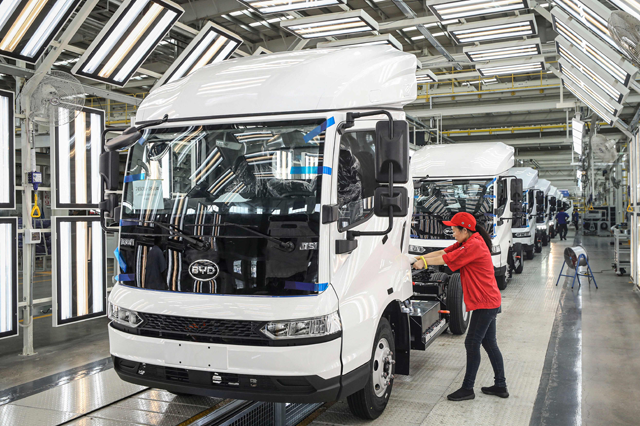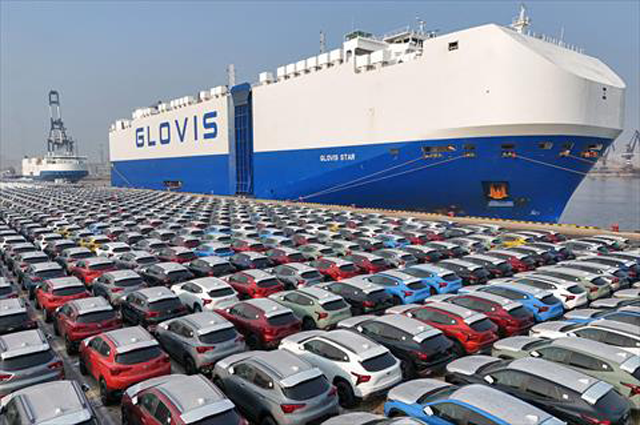You are here
Chinese EV giant BYD posts 24.4% rise in profit
By AFP - Aug 28,2024 - Last updated at Aug 28,2024

An employee works on a new energy vehicle assembly line at a BYD factory in Huai'an, in China's eastern Jiangsu province on Monday (AFP photo)
BEIJING — Leading Chinese automaker BYD posted on Wednesday a 24.4 per cent rise in net profit for the first half of 2024, boosted by continuing strong demand for electric cars in its home and overseas markets.
The company posted a net profit of $1.91 billion in the January-June period, up from $1.54 billion in the same period last year, according to results published at the Hong Kong Stock Exchange where BYD is listed.
The firm said sales during the period stood at $42.3 billion, up 15.8 per cent year-on-year.
The Shenzhen-based company , which adopts the English slogan "Build Your Dreams" , is the most prominent EV manufacturer in China, the world's largest automotive market.
Leaders in Beijing are aiming for car sales to be mainly made up of electric and hybrid models by 2035.
In July, such vehicles accounted for more than half of all domestic sales, passing the threshold for the first time, according to the Chinese Association of Automobile Manufacturers.
Generous government subsidies initially helped sales take off, but the policies were phased out in late 2022 and the market now appears to be reaching maturity.
Local EV firms have since been locked in a cut-throat price war as they fight to remain competitive, weighing on their profitability.
BYD has "effectively dealt with challenges brought by intensified industrial competition", it said in the filing.
Overseas challenges
BYD and other Chinese EV giants have accelerated overseas expansion in recent years, despite concerns in Western countries that local markets will become flooded with imports at prices they view as artificially low.
The European Union has alleged that Beijing's automotive subsidies have given Chinese firms an unfair leg up in foreign markets, distorting competition and harming the competitiveness of European automakers.
Earlier this month, Brussels released a draft plan to impose tariffs of up to 36.3 per cent on Chinese EVs — a measure that will become permanent in October unless a deal is reached with Beijing.
The United States said in May that it would significantly raise customs duties on Chinese EVs to 100 per cent.
Canada also announced a 100 per cent tariff on Monday, accusing China of "not playing by the same rules as other countries" in areas such as environmental and labour standards.
BYD has nonetheless been ramping up globalisation efforts, with plans to open factories in Hungary and Turkey.
Originally specialising in the design and production of batteries, BYD diversified into the automotive industry in 2003.
Related Articles
AMMAN — The trade deficit in the first seven months of 2020 dropped by 24.4 per cent to JD3.540 billion compared with last year’s JD4.682 bi
Beijing — Chinese carmaker BYD saw a surge in revenue last year, surpassing the $100 billion mark and beating rival Tesla as the electric ve
TOKYO — China's global dominance in electric cars helped it overtake Japan as the world's biggest vehicle exporter last year, official data












